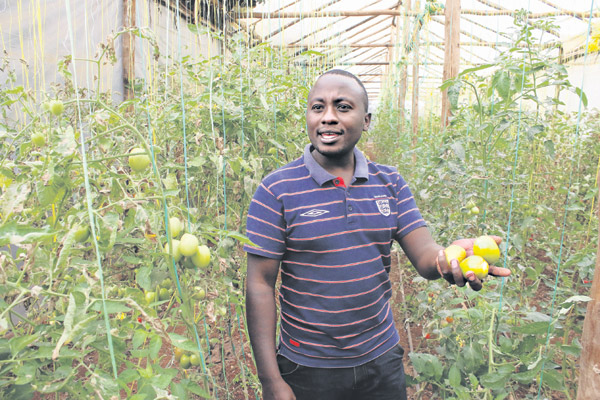King’ori Mathenge knows too well how farming took him out of desperation after he was unable to get a job upon graduating in December 2010.
The 32-year-old has four greenhouses where he practices organic farming which relies on green manure, compost and biological pest control. He sells the produce to hotels in Nyeri and the Coast.
Mathenge chose organic farming because most people are running away from crops grown using chemicals. He gets the manure from the 450 chicken he rears on his farm.
He also buys sheep manure from pastoralists in Doldol, Laikipia County, which he mixes with the chicken manure to grow his crops.
He says he had no idea on farming and had to attend farmers’ field days and agricultural shows to get some tips before starting. He attended one such meeting at Wambugu Farmers Training Centre in Nyeri.
However, he says he had never contemplated farming until 2011 when he failed to get a job after one year of searching.
“All I thought of was an office job where I would always be in a suit and tie. However, after several months of joblessness, I had to think outside the box. I needed to earn a living and that is when I thought of farming,” he says.
GAPS
“But before I decided what to grow, I studied the market to find the gaps I should fill,” he told Seeds of Gold at his farm.
“I have realised that deciding what to grow is where many farmers go wrong. That is why you find a product flooding the market because everyone is growing it,” Mathenge says and adds that soil tests also help to know what type of crop can do well in a particular area and farm.
Mathenge had to seek his father’s permission to use his quarter an acre land in Kirurumi village, near Aberdare Forest for farming.
And to keep pests away, Mathenge has been practicing crop rotation, another aspect of organic farming.
“To succeed in farming, one must grow crops that the market needs and not what everyone is growing. You must also ensure the crops are not harmful to human life, such as those grown with chemicals,” Mathenge adds. And according to John Wambugu, an officer from the ministry of Agriculture, organic farming in greenhouses is the best these days.
“In greenhouses, temperatures are warm and this speeds up growth of crops while reducing fungal infections,” Wambugu says.
He says although organic farming in greenhouses is rather expensive, it is the way to go since most people are shying away from crops grown using chemicals due to related health and environmental dangers,” Wambugu adds.
“I started with a small greenhouse measuring 15m by 6m where I grew 400 seedlings of tomatoes,” he says. The crop earned him Sh90,000 within six months.
The young farmer has his market for tomatoes mainly in hotels in Nyeri. He also supplies some to traders in markets. He sells capsicum in Mombasa and Nairobi.
However, the prices are not constant and depends with supply in the market at a particular time.
“I sell a kilo of capsicum at a minimum of Sh100 while that of tomato goes for Sh80,” he notes.
BIGGER GREENHOUSES
Later on, Mathenge put up another greenhouse, bigger than the first one which earned him Sh150, 000 from the first harvest. By this time, he had two greenhouses. He harvested twice in one and earned Sh180,000 before hailstorm destroyed his crops.
Mathenge did not lose hope. He borrowed money from his father, renovated the greenhouse and constructed a third one. He would reap Sh300,000 soon after selling capsicum from the third greenhouse.
He says he later earned Sh60,000 after selling tomatoes before hotels at the Coast stopped buying his capsicum after business went down due to terror attacks. “I was forced to concentrate more on tomato farming,” he says.
With his mode of farming, he has been able to control common diseases such as Powdery Mill Dew that affects both crops and Tuta Absoluta. With this the bachelor of commerce graduate continues to say no, thanks to job offers.
Eustace Gachanja, the coordinator of the Kenya Organic Agriculture Network says organic farming is not as expensive as some think.
Other than enhancing yields by applying manure, crop rotation and planting of legumes, Gachanja says farmers can also have their farms certified as organic to enable them sell at premium prices in selected organic shops and restaurants.
“We also issue the East Africa Organic Mark to those who comply with the standards to enhance organic farming,” says Gachanja.









